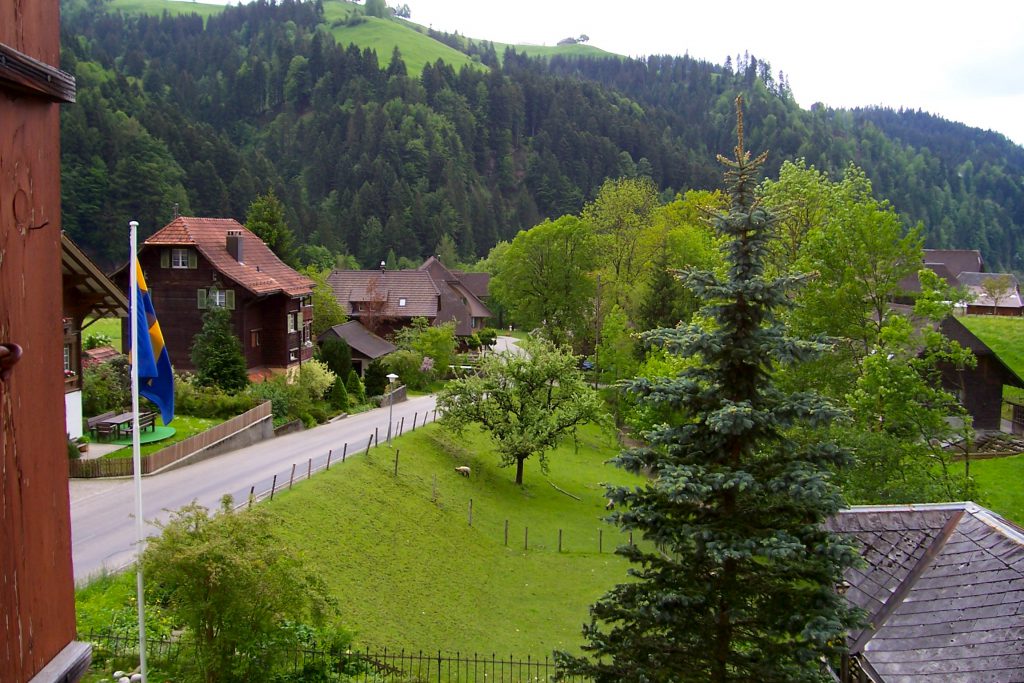This morning it came to my attention in three different ways of the article in Lancaster Online article about the recent hymn sing in which different Anabaptist groups sang their songs. You can hear songs from all of the groups: The Amish, The Old Order River Brethren, Groffdale Mennonite Conference, Weaverland Mennonite Conference, and the Church of the Brethren. The Lancaster Mennonite Historical Society and the Swiss Pioneer Associates host these combined hymn sings every few years.
I love the remark made by one of the Amish song leaders. At the end of one of the songs, he said, “As you listen to the singing here, does it surprise you that an Amish service lasts three hours; Old Order Mennonites, two hours; and Lancaster conference, one hour?” That is such Amish humor, and it reminds me of one of the things I miss about my original community.
I noticed that the Amish song that’s posted sounds different from what I remember. It’s as if the singers are not singing in unison part of the time. I remember in church services of my childhood when the singers would sometimes get hung up with the tune, but always there was someone who would start the line over and get everyone back on track. I’m sure it was often a matter of the singer’s interpretation of the song that would get “right” the song. When I was listening to this song, it seemed there were different interpretations of the song going on. The following quote from the article might explain this:
For generations, Amish songbooks did not have musical notes. The songs are learned by ear. Then a group came along with the idea that these hymns should be preserved. They painstakingly recorded the notes for the sake of history and the church.
“We are getting closer and more unified, as a community. We’re singing more and more as a whole and our younger generations are now relying on the notes to keep these tunes preserved,” the song leader says. “Before there was a little bit of arguments: ‘My grandfather always sang the songs right. Sam’s grandfather had a little bit disoriented.’ With the notes, it unifies our community and I appreciate that and most of our people do appreciate that.
I can only imagine that when the notes were being “painstakingly recorded” that it was a matter of someone’s interpretation, and that it would cause some confusion for those who have always relied on singing be ear. I can also imagine that it would confuse the issue of whose voice to follow when two different interpretations are going on. I don’t think I could have followed along in that song, and usually I can with the words in front of me.
I would predict that the Swartzentruber and other more traditional Amish groups are never going to sing while relying on recorded notes. It ought to be interesting in the generations to come, how both groups preserve their songs, and how much they will vary in their interpretations.
Regardless of all this, I love the idea of these groups coming together to sing. I wish I could have been there! There is something so harmonious about these different groups coming together to sing. After all the strife and church splits of the Anabaptists over the centuries, these groups are now coming together to preserve and share centuries-old songs. I love the prayer Bishop David Sauder, of the Old Order River Brethren, started with:
“For an eternity, singing is significant here and in heaven. We want to thank the Lord for the privilege to do something that will carry over into eternity.”
Beautiful!
And to think that it all started in the Emmental Valley of Switzerland, nearly 500 years ago, a place I had the privilege of visiting in the summer of 2006 and again this past February. Sometimes I feel such a connection to my heritage. All the people before me are part of me sitting here, looking out into the leaves and branches of our birch tree blowing in the summer breezes. I give thanks to God for all that is.

Photo by Saloma Furlong
A view from our room of the inn in Trub, Switzerland, Summer 2006


Thank you for sharing this post. Aylmer Ontario where I lived for thirteen years was made up of people from the following communities and each one had a slight different tune to Des Lobelied. There were people from Milverton Ontario, Holmes County Ohio, Lancaster PA, Daviess County Indiana, Kalona IA & Dover DE. I think the Daviess County tune was the predominant one as they were the first settlers to live in Aylmer and set the tune. And yet most people got familiar with all of these tunes and it never caused much of a problem.
Saloma! I just finished The Unsettlers: In Search of the Good Life in Today’s America, by Mark Sundeen. The book is a new book here at the SPL. I thought of you as I read it, as many of the people in the book relied on the neighboring Amish and Mennonites to teach them about simple living. The book is in 3 sections: Missouri, Detroit and Montana. If you are interested, it is here on the returns cart.–Vanessa